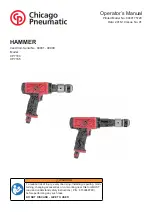
Oscillating Tool EN
9
OPERATING INSTRUCTIONS
NOTE:
Before using the tool, read the
instruction book carefully.
INTENDED USE
The power tool is intended for sawing and
remodelling wooden materials, plastic,
plaster, non-ferrous metals and fasteners (e.g.
nails and clamps) as well as for working on
soft wall tiles and for dry grinding of small
surfaces. It is especially suitable for working
close to edges and for flush cutting.
ASSEMBLY AND OPERATION
Action
Figure
Mounting accessories
See Fig. A-C
Mounting the sanding
sheet
See Fig. D
Mounting the suction
device
See Fig. E1-E5
Operating the on/off
switch
See Fig. F
Using the variable speed
dial
See Fig.G
The Variable Speed Dial can be used to set
the optimum oscillating frequency according
to the accessories used and the respective
application.
Oscillation
Frequency
Application
High oscillation
frequency
Sanding, sawing,
rasping and
polishing stone and
metal.
Low oscillation
frequency
Scraping, polishing
varnishes.
WORKING HINTS FOR YOUR
TOOL
If your power tool becomes too hot, especially
when used at low speed, set the speed to
maximum and run it with no load for 2-3
minutes to cool the motor. Avoid prolonged
usage at very low speeds. Always keep the
blade sharp.
Always ensure the workpiece is firmly held or
clamped to prevent movement.
Any movement of the material may affect the
quality of the cutting or sanding finish.
Start your tool before working and turn it off
only after you stop working.
Do not start sanding without having the
sandpaper fitted.
Do not allow the sandpaper to wear away , it
will damage the sanding pad. The guarantee
does not cover sanding pad wear and tear.
Use coarse grit paper to sand rough surfaces,
medium grit for smooth surfaces and fine grit
for finishing surfaces. If necessary, first make
a test run on scrap material.
Excessive force will reduce the working
efficiency and cause motor overload.
Replacing the accessory regularly will
maintain optimum working efficiency.
MAINTAIN TOOLS WITH
CARE
Remove the plug from the socket before
carrying out any adjustment, servicing or
maintenance.
Your power tool requires no additional
lubrication or maintenance. There are no
user serviceable parts in your power tool.
Never use water or chemical cleaners to clean
your power tool. Wipe clean with a dry cloth.
Always store your power tool in a dry place.
Keep the motor ventilation slots clean. Keep
all working controls free of dust. Occasionally
you may see sparks through the ventilation
slots. This is normal and will not damage your
power tool.
If the supply cord is damaged, it must be
replaced by the manufacturer, its service
agent or similarly qualified persons in order to
avoid a hazard.










































